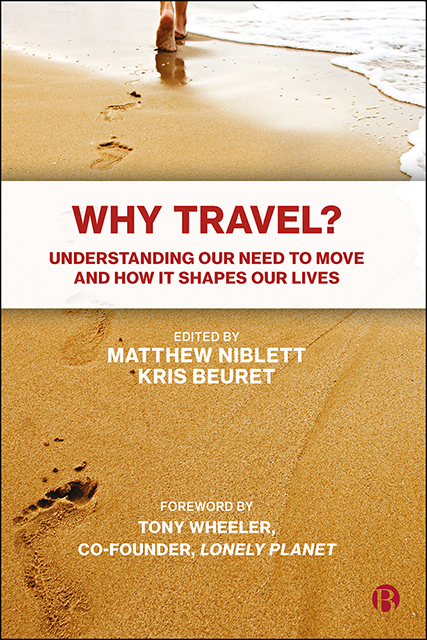Book contents
Foreword
Published online by Cambridge University Press: 21 April 2023
Summary
Travel? Oh I remember that. I visited 14 countries in 2019, if we count Transnistria as a country, and 20 the year before. Even in 2020, before it all went wrong, I’d been to five countries – at home in Australia, in Japan (for a university conference on ‘Overtourism’, remember overtourism?), then the UK, Egypt and Yemen before I had to rush home as the gates slammed shut. And slam shut they most definitely did. Indeed, in this very book Chapter 4 on Philosophy notes that the USSR didn't like Article 13 of the UN Declaration of Human Rights, which insists that entering and leaving your own country is a basic human right, but today it's Australia which has totally tossed out that right. You’re trapped in Australia, unless you’re a movie or sports sta or billionaire friend of the government of course.
So every chapter of Why Travel underlines just how important travel has been and will continue – one day – to be in my life. Since writing Lonely Planet's first guidebook – almost 50 years ago – travel has been my work and my life, but just as football is much more important than mere life and death, so travel has been much more for me. Fortunately, like many of us suffering an enforced travel-free diet, it's been surprising how much travel I still enjoyed, certainly I’ve rediscovered and extended the boundaries of my own back yard. The pandemic has emphasized how much nature and how many birds pop up right outside my kitchen window, I’ve rediscovered so many travel memories, partly through finally getting around to sorting out my much too extensive pre-digital (i.e. colour slide) photo collection.
Perhaps most important, I’ve had plenty of time to ponder just why travel is so important. Certainly the pandemic has been an enforced opportunity to look at the problems travel brings – from overtourism to environmental and climate damage – and examine how we can do things differently post-pandemic. But there has also been plenty of opportunity to think about the good stuff that travel does and worry about people, far from our sheltered first world, who have been doing it really hard over the past year. ‘Come back, we miss you’, has been a message from an awful lot of tourist destinations and most emphatically from those developing world locations where tourist income was a huge part of the local economy.
- Type
- Chapter
- Information
- Why Travel?Understanding Our Need to Move and How It Shapes Our Lives, pp. xvii - xviiiPublisher: Bristol University PressPrint publication year: 2021

